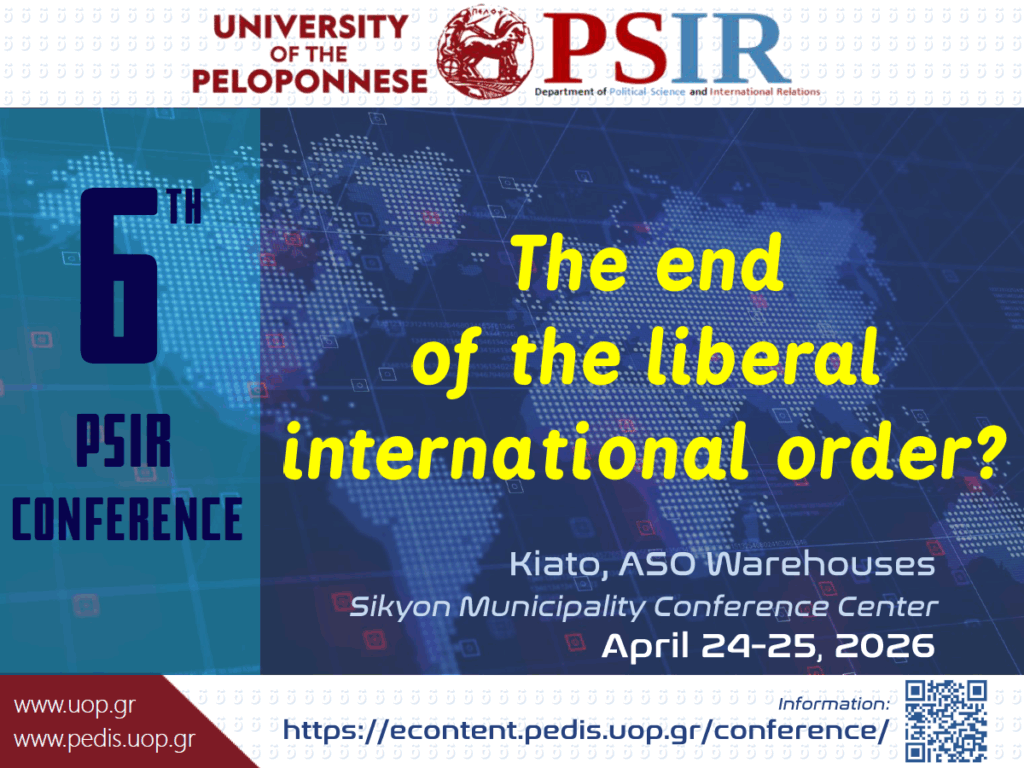The end of the liberal international order?
Kiato, ASO Warehouses – Sikyon Municipality Conference Center
April 24-25, 2026
Conference Theme
From the beginning of Donald Trump’s second presidential term, it has become clear that his policies and style of power mark a potentially total questioning of the constants and certainties that have characterized the US stance and its place in the world, and ultimately the post-war order itself.
Developments are taking place rapidly, in a period that has already been characterized as a period of polycrisis, and raise multiple questions about their implications in almost every field of interest in Political Science and International Relations, and social sciences and humanities in general. How does the US redefine its allies and adversaries in relation to how it perceives its national interests and the threats and opportunities posed to them by a world in flux and transition? What are the implications for existing international alliances, international organisations and international law? How is the international order affected and what about security? What are the disturbances caused by the tariff “war” and what are the implications for international trade and the global economy? What are the dangers of Trump’s denial of the existence of a climate crisis given the ineffective response to it so far? What is the state of liberal democracies in the light of pressures from authoritarian leaders, the rise of the far right, attacks on press freedom and the spread of disinformation on social media? How are migration and asylum policies, the defense of human rights and the concept of borders being redefined? What trends can be observed in the so-called culture wars and in the woke culture controversy? What are the changes brought about by the rapid development of artificial intelligence in the economy and the labour market, and how can its fair use and democratic control be ensured?
These unprecedented developments have already become the focus of international scholarly attention. Seeking to contribute to their exploration and discussion with the Greek and international academic community of political, social, economic, historical and legal sciences, the Department of Political Science and International Relations of the University of the Peloponnese is organizing its sixth regular conference, inviting the submission of papers in Greek or English, which will be the languages of the conference. It will be held in Kiato, Corinthia, in recently reconstructed facilities of the Municipality of Sikyonia, by the sea. Kiato is connected to the airport via the suburban railway, while in addition, intercity buses to Athens and elsewhere are also available.
Thematic Sections
Among the issues proposed for discussion are the following:
- New international order or global disorder?
- Euro-American relations in Trump’s second term
- The idea of a peace movement today
- Security and defence in the European Union during Trump’s second term
- The prospect of European integration: Crises, purposes, institutions and policy outcomes
- A Democracy and Rule of Law Compass for the European Union 2025-2029
- Guidelines and toolbox for better EU regulation 2025-2029
- International Political Economy: From cooperation to conflict?
- Economic factors contributing to the new US policy and the new economic environment: Τrends, challenges, risks
- Emerging powers and global governance
- Liberal democracies in question: Crisis of confidence, authoritarianism, far-right
- The artificial intelligence revolution: Public administration, economy, society
- EU policies for digital transformation and technological sovereignty
- Interculturalities: Gender, immigration, identities
- Cultural dimensions and societal implications of political authoritarianism
- Redefining education in the age of uncertainty: Digital transformation, inclusion and international cooperation
- Organised civil society and governance
- Governance and efficiency: Institutional and political parameters
- The Greek party system: Party dealignment, fragmentation, antisystemic tendencies
- Constitutional revision
- The challenges for Greek foreign policy during Trump’s second term
- Greek-Turkish relations in the era of international deregulation
- International Law of the Sea, developments in the Aegean and Cyprus and the new Trump Administration
- Public administration in an era of perpetual crisis: Challenges of state reform
- Local development in Greece: In search of sustainability

